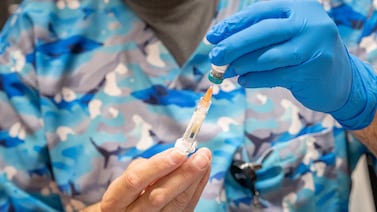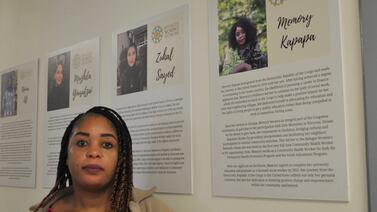Public health, explained: Sign up to receive Healthbeat’s free New York City newsletter here.
Most New Yorkers infected with Covid experienced symptoms for a month or longer, the New York City Department of Health and Mental Hygiene found in a survey.
Of more than 2,000 adults infected with Covid who were surveyed by the Health Department in late 2022, 80% reported at least one post-acute symptom — a symptom lasting for a month or longer. The most commonly reported symptoms were fatigue and decreased exercise tolerance, according to the survey, which was released in late December.
The findings suggest that Covid symptoms frequently extend beyond one or two weeks, which is often referenced as the recovery period for mild or moderate cases. While 21% of surveyed adults reported no post-acute symptoms, 30% reported at least one mild symptom, 29% reported at least one moderate symptom, and 21% reported at least one severe symptom, according to the survey.
“It’s very common for people to experience some symptoms that last up to a month, and potentially longer than a month,” said Sam Packard, the senior project manager for Long Covid surveillance at the Health Department, who co-authored the report on the survey.
Some people with post-acute symptoms may go on to develop Long Covid, a chronic condition characterized by symptoms of more than three months, which can be severe or disabling. The Health Department survey did not assess the prevalence of Long Covid, but the agency has several ongoing data collection initiatives focused on the condition, Packard said.
It’s not unusual to have a “long tail” of recovery following a Covid infection, said David Putrino, the Nash Family Director of the Cohen Center for Recovery from Complex Chronic Illnesses at Mount Sinai Health System. The Health Department’s findings are consistent with larger epidemiological studies, as well as with his own clinical experience, he said.
“A majority of people do not quickly recover from an acute SARS-CoV-2 infection,” said Putrino, who is also a professor in the Department of Rehabilitation and Human Performance at the Icahn School of Medicine at Mount Sinai.
In the Health Department survey, New Yorkers reported a wide range of post-acute symptoms, from anxiety and difficulty concentrating to coughs and muscle aches. Decreased exercise tolerance and fatigue were each reported by about half of all surveyed adults.
Of New Yorkers with at least one severe post-acute symptom, most reported activity limitations, and 1 in 3 had probable depression, according to the survey. People with at least one severe post-acute symptom also reported 10 days of reduced ability, or an inability, to complete typical activities or work, compared with six days for those with moderate symptoms and three days for those with mild symptoms.
Putrino, who treats Long Covid patients at the Cohen Center, noted that fatigue and post-exertional malaise — the worsening of symptoms after physical or mental activity — can be “quite disabling.” A Covid infection is a significant event, he emphasized.
“It’s not necessarily an easy and simple recovery from SARS-CoV-2, even if your acute illness is mild,” he said.
The Health Department’s survey found a similar prevalence of mild symptoms across socio-economic groups. But moderate symptoms were more prevalent among Latino and Asian/Pacific Islander adults than among white adults, and severe symptoms were more prevalent among Latino and Black adults than among white adults. Moderate and severe symptoms were also more prevalent in higher-poverty neighborhoods than in lower-poverty neighborhoods.
Packard noted that those findings reflect many of the structural determinants of health that produced unequal outcomes in Covid cases, hospitalizations, and deaths during the height of the pandemic.
“Those same structural determinants of health are at play when it comes to who’s experiencing severe illness, prolonged illness, post-acute symptoms, potentially even going on to develop Long Covid,” he said.
While the survey did not assess the prevalence of Long Covid, it found uncertainty among New Yorkers about the condition. Many people said they were unsure whether they had Long Covid. More than half of New Yorkers with post-acute symptoms said they had sought out a health care provider for their symptoms, and many reported receiving help. But the vast majority — even those with severe symptoms — said their provider had not talked to them about Long Covid.
Those findings highlight the need for better Long Covid education for the public, health care providers and policy makers, Packard said.
At the Cohen Center, which Putrino directs, the demand for Long Covid care has been overwhelming, he said. The clinic uses a precision medicine approach, performing comprehensive assessments on patients and treating specific deficits.
Long Covid remains a challenging condition to treat. Putrino said that for the majority of patients, the clinic can help improve symptom burden and the ability to function, but a small percentage of patients do not seem to recover.
“We can’t possibly manage the amount of Long Covid cases that are beating down our doors,” he said. “So we see the only way forward is to educate others on how to identify and then how to manage Long Covid and other infection-associated chronic conditions. That has largely become our mission.”
Eliza Fawcett is a reporter covering public health in New York City for Healthbeat. Contact Eliza at efawcett@healthbeat.org .







